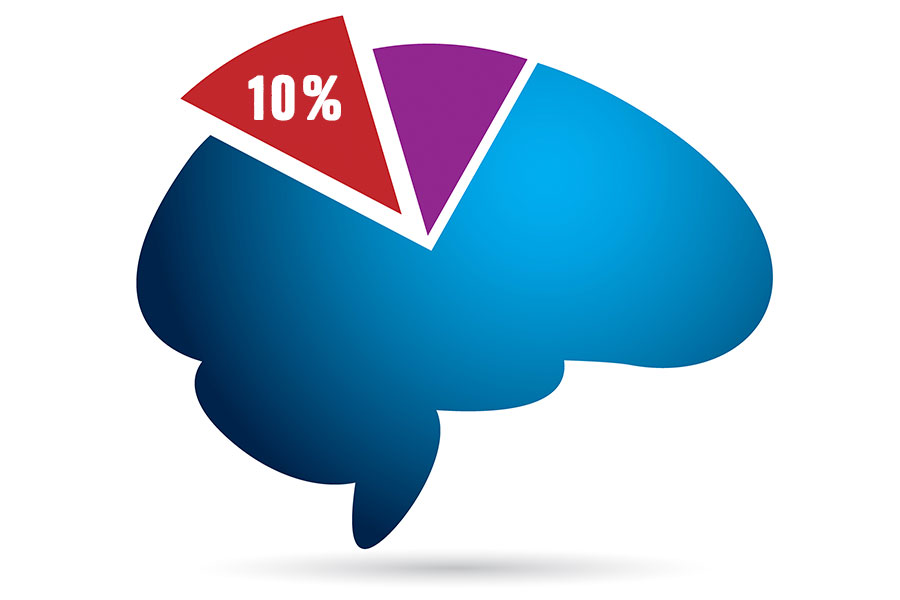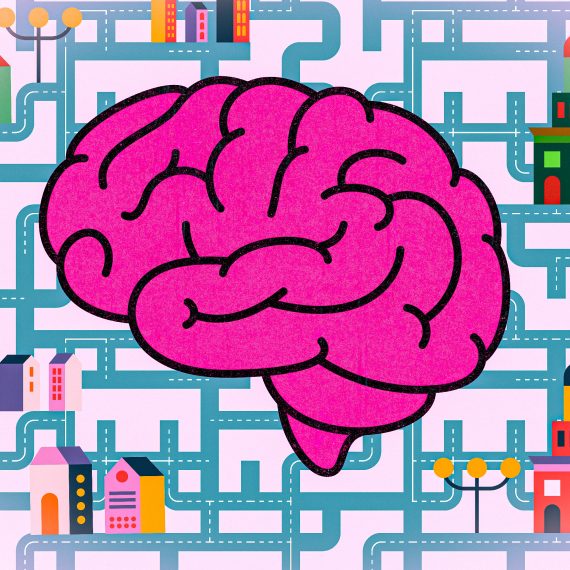Do we only use 10 percent of our brain?
The human brain houses incredibly complex and advanced functions—but do we only access a fraction of it?

Movies like “Limitless” and “Lucy” play on the notion that humans use only 10 percent of their brains—and those who unlock a higher percentage wield powers like infinite memory or telekinesis. It’s enticing to think that so much of the brain remains untapped and is ripe for boosting human potential.
But the idea that we use 10 percent of our brain is 100 percent a myth.
In fact, scientists believe that we use our entire brain every day. Mila Halgren is a graduate student in the lab of Mark Harnett, an associate professor of brain and cognitive sciences and an investigator at the McGovern Institute. The Harnett lab studies the computational power of neurons, that is, how neural networks rapidly process massive amounts of information.
“All of our brain is constantly in use and consumes a tremendous amount of energy,” Halgren says. “Despite making up only two percent of our body weight, it devours 20 percent of our calories.” This doesn’t appear to change significantly with different tasks, from typing on a computer to doing yoga. “Even while we sleep, our entire brain remains intensely active.”
When did this myth take root?

The myth is thought to have gained traction when scientists first began exploring the brain’s abilities but lacked the tools to capture its exact workings. In 1907, William James, a founder of American psychology, suggested in his book “The Energies of Men” that “we are making use of only a small part of our possible mental and physical resources.” This influential work likely sparked the idea that humans access a mere fraction of the brain—setting this common misconception ablaze.
Brainpower lore even suggests that Albert Einstein credited his genius to being able to access more than 10 percent of his brain. However, no such quote has been documented and this too is perhaps a myth of cosmic proportion.
Halgren believes that there may be some fact backing this fiction. “People may think our brain is underutilized in the sense that some neurons fire very infrequently—once every few minutes or less. But this isn’t true of most neurons, some of which fire hundreds of times per second,” she says.
In the nascent years of neuroscience, scientists also argued that a large portion of the brain must be inactive because some people experience brain injuries and can still function at a high level, like the famous case of Phineas Gage. Halgren points to the brain’s remarkable plasticity—the reshaping of neural connections. “Entire brain hemispheres can be removed during early childhood and the rest of the brain will rewire and compensate for the loss. In other words, the brain will use 100 percent of what it has, but can make do with less depending on which structures are damaged.”
Is there a limit to the brain?
If we indeed use our entire brain, can humans tease out any problem? Or, are there enigmas in the world that we will never unravel?
“This is still in contention,” Halgren says. “There may be certain problems that the human brain is fundamentally unable to solve, like how a mouse will never understand chemistry and a chimpanzee can’t do calculus.”
Can we increase our brainpower?
The brain may have its limits, but there are ways to boost our cognitive prowess to ace that midterm or crank up productivity in the workplace. According to Halgren, “You can increase your brainpower, but there’s no ‘trick’ that will allow you to do so. Like any organ in your body, the brain works best with proper sleep, exercise, low stress, and a well-balanced diet.”
The truth is, we may never rearrange furniture with our minds or foresee which team will win the Super Bowl. The idea of a largely latent brain is draped in fantasy, but debunking this myth speaks to the immense growth of neuroscience over the years—and the allure of other misconceptions that scientists have yet to demystify.




